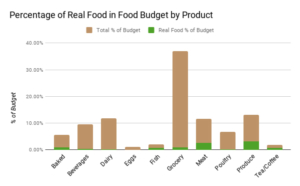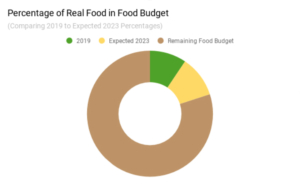SOU exceeding expectations in Real Food Challenge
(Ashland, Ore.) — Southern Oregon University joined universities across the country last year in working toward sustainable food practices by participating in the Real Food Challenge. Now that a year has passed, statistics show that SOU is exceeding expectations.
SOU joined more than 40 U.S. universities and four university systems by joining the Real Food Challenge, a student-founded activist organization dedicated to supporting and creating ecologically sustainable, human and socially equitable food systems.
When President Linda Schott signed the “SOU Real Food Campus Commitment,” she pledged that at least 20 percent of SOU’s food budget would be Real Food – created through sustainable, human and equitable systems – by 2023.
SOU also committed to establishing a transparent reporting system and filing annual progress reports to evaluate where the SOU Real Food Challenge team should focus. The data of the first year’s budget was recently released, which has been organized by category and color-coded for easy comparison.

The bar graph shows percentages of SOU’s overall food budget by categories (in brown), and the percentage of the overall food budget that Real Food accounts for in each category (green). For instance, produce makes up 13.1 percent of the overall food budget, and the produce that qualifies as Real Food accounts for 3.2 percent of the overall budget. The Real Food percentages from all of the categories add up to 9.4 percent of the university’s overall food budget – nearly halfway to the university’s goal of 20 percent by 2023.

All of that progress was made in a single year of the five-year challenge, and even more changes have been made to how the school purchases coffee, produce and grocery items since this data was collected.
By the end of the spring term 2020, SOU’s Real Food Challenge team will be able to compare the changes they’ve made across multiple years to see how quickly they’re reaching the 20 percent goal. The Real Food Challenge team’s student leaders, Jamie Talarico and Jessica Zuzack, can be reached via their email for questions about the program.
Story by Blair Selph, SOU Marketing and Communications student writer


